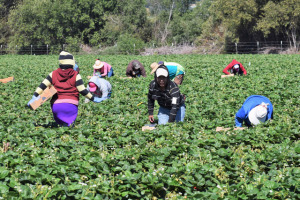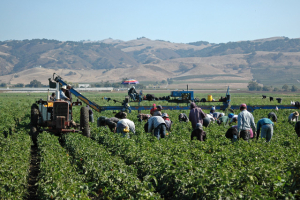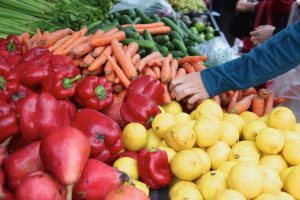
Success All Around in California’s Budget and Promising Developments in DC
October 11, 2022 Roots of ChangeExtreme drought, heat, fire, superstorms and malnutrition abound. Luckily governments at all levels are slowly building up steam to address these threats born of climate change, racism and poverty. I am especially pleased by the progress made this year with our allies from the Food and Farm Resilience Coalition. We successfully advocated for over $700 million approved in the 2022-23 California budget. Add that to the $1.3 billion in the 2021-22 budget and we can comfortably claim that $2 billion will accelerate transformation of our food system. I think you will agree as you review below the amazing array of programs that were part of our Coalition’s advocacy goals.
Climate Smart/ Resilient Farms (CDFA): $330 million, which includes the following:
- Healthy Soils Program: $85 million
- State Water Efficiency and Enhancement Program (SWEEP): $110 million
- Dairy Methane Programs and methane reduction research: $88 million
- $48 million for both Alternative Manure Management Program (AMMP) and Dairy Digester Research and Development Program with priority for AMMP.
- $20 million for AMMP (additional to the $48 million described above).
- $10 million for a new enteric fermentation demonstration project and research grants program, which seeks to reduce methane emissions from livestock.
- California Underserved Producers Program (CUSP), which providestechnical assistance support to historically overlooked farmers (BIPOC and small scale) applying for economic relief grants for business planning, marketing strategies, and implementation of climate smart practices: $5 million.
- Organic Transition Pilot Program (new) and organic transition plans: $12 million
- Conservation Management Planning Program for farms and ranches: $15 million
- Integrated Pest Management: $3.75 million; Plus $1.075 million for integrated pest management technical assistance, which lowers harmful pesticide use.
- Pollinator Habitat Program: $15 million
- Climate Smart Farms (Department of Conservation): $39 million, which includes the following:
- Climate Smart Land Management Program (new): $14 million for landowner technical assistance for the new Natural and Working Lands Climate Smart Strategy, as proposed by the Governor’s administration
- Sustainable Agricultural Lands Conservation Program: $25 million (in addition to the program’s continuous Greenhouse Gas Reduction Fund appropriation)
Farmworker Safety and Well-Being (various departments): $65 million, which includes the following:
- Joe Serna, Jr. Farmworker Housing Grant Program (Dept. of Housing and Community Development) to develop modern housing: $50 million
- Low-Income Home Weatherization for Farmworker Housing (Dept. of Community and Development Services), which is critical given rising temperatures: $15 million
Drought Resilience, Sustainable Groundwater Management, Prescribed Grazing (various departments): $205 million, which includes the following:
- Fire Prevention Grants, including prescribed grazing projects and infrastructure (CalFIRE): $80 million
- California Small Agricultural Business Drought Relief Grant Program (Go-Biz): $75 million
- Sustainable Groundwater Management for Small Farmers (Dept. of Water Resources): $10 million
- Multi-benefit Land Repurposing Program (Dept. of Conservation): $40 million
Healthy Food Access/Regional Food Economies (CDFA): $70 million, which includes the following:
- Farm to School Incubator Grant Program: $60 million
- Healthy Refrigeration Program, which provides corner stores in low income urban and rural communities with coolers and technical assistance to support access to fresh produce from California farms, a program which ROC created with LCHC: $10 million
Additional noteworthy agriculture investments (various departments):
- $1 million for a new Land Equity Task Force, Strategic Growth Council, to help new and beginning farmers to access land.
- $23.75 million for the Food Processing Investment Program, CA Energy Commission
- $7 million for a new Compost Permitting Pilot at CalRecycle
- $10 million for food waste diversion, digesters at CalRecycle
- $2 million for dry wine grape farming grants, Dept. of Water Resources
- $75 million for university farm programs “to address climate-smart agriculture and other climate-related issues, including, but not limited to, sustainable food production and agriculture, water and drought resilience, forest health and wildfire resilience, food biosecurity, and energy.”
- $25 million for Smart Agriculture as part of the Climate Catalyst Revolving Loan Fund, Go-Biz.
Extreme Heat and Smoke Victories
As part of our ARC project, ROC also advocated with our allies for the following bills designed to protect farmworkers and others from heat illness. Given the record-breaking heat waves this summer with more ahead, heat is a threat to be addressed. These bills achieve baseline needs that will move the state toward a comprehensive policy framework. In tandem with our state work, we have joined our Ventura County ARC Project Allies to successfully achieve language justice for farmworkers. The new Ventura County smoke alert system will provide indigenous languages audio alerts. In the years ahead we will advocate to extend such a system to heat warnings, using achievements from this year.
- AB 941 Farmworker Resource Centers Grant Program, based on the model created by Ventura County.
- AB 1643 Extreme Heat Advisory Committee
- AB 2238 Statewide Extreme Ranking System
Finally, we joined Alchemist EDC and NextGen Policy and successfully advocated for SB 907. It establishes the Local, Equitable Access to Food (LEAF) Program to create a noncompetitive grant program designed to expand the use of EBT (CalFresh) acceptance systems at California certified farmers’ markets and tribe-operated farmers’ markets on Indian reservations. It also provides ancillary supports related to acquisition and staffing of the EBT machines which have been huge bottlenecks for market operators. The law still requires funding and we will pursue that with NextGen and Alchemist next year.
Overall, it was a very good year for those of us wanting a more just, resilient and healthy food system for the state.
Federal Progress
Now some of our attention will turn to the next Farm Bill and the aftermath of the White House Conference on Hunger, Nutrition, and Health held on September 28th. Our Policy Specialist Lesley Kroupa and many allies were in Washington DC for several events linked to the Conference. ROC applauds the Biden Administration strategy to end nutrition insecurity. Stay tuned, much more to come in the months ahead related to our federal policy work.



